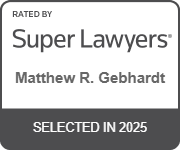1425 McHenry Road, Suite 204, Buffalo Grove, IL 60089
●Free Initial Consultation
Waukegan DUI Defense Attorney

Intoxicated Driving Defense Lawyer in Waukegan
DUI charges may apply in situations where drivers are pulled over by police officers on suspicion that they are intoxicated due to the use of drugs or alcohol. These charges can have far-reaching consequences, affecting a person's freedom, financial stability, and future opportunities. At The Law Offices of Matthew R. Gebhardt, P.C., we work to ensure that people in Waukegan and the surrounding areas who have been charged with DUI can defend against convictions. We work to build effective defense strategies that will minimize the negative effects of these charges.
Misdemeanor DUI Charges
In Illinois, most first-time DUI and second DUI offenses are classified as misdemeanors. However, even misdemeanor charges can lead to severe penalties and lasting repercussions. A misdemeanor DUI charge may apply if a driver had a blood alcohol content (BAC) of at least 0.08 percent, if they had been using marijuana, or if they had even a trace amount of controlled substances in their system.
The penalties for a misdemeanor DUI conviction can include:
- Fines: A maximum fine of $2,500 will apply for a Class A misdemeanor conviction, and multiple other types of fees and court costs will also be imposed.
- Imprisonment: The maximum sentence for a Class A misdemeanor is one year in jail. For a second DUI conviction, a person will be required to serve a mandatory minimum sentence of five days, or they may perform 240 hours of community service.
- License revocation: A first DUI conviction will result in a driver's license revocation of at least one year, and a second DUI conviction will result in a revocation for a minimum of five years.
Felony DUI Charges
A person who is charged with felony DUI, which is also known as aggravated DUI, will face harsher penalties if they ar convicted. A DUI offense may be elevated to a felony for several reasons, including:
- Multiple DUI convictions: A third or subsequent DUI is classified as a felony.
- DUI resulting in serious injuries or death: A person may be accused of causing a car accident because they were intoxicated. DUI offenses involving accidents where one or more people suffer significant bodily harm, permanent disability, disfigurement, or death are charged as felonies.
- Driving with a revoked or suspended license: When a person has lost their license because of a previous DUI offense, a subsequent DUI charge during the period of suspension or revocation will be charged as a felony.
- DUI with a minor in the vehicle: Being arrested for DUI with a child under the age of 16 in the car will result in felony charges.
The penalties for felony DUI convictions can include prison sentences of at least one year and potentially several years, fines as high as $25,000, and permanent license revocation in some cases. A felony conviction will remain on a person's criminal record, impacting their future employment opportunities, their ability to find housing, and other aspects of their life.
Statutory Summary License Suspensions and Ignition Interlock Devices
While a DUI conviction will result in the loss of a person's driving privileges, license suspensions may go into effect even if a person is never convicted. Under Illinois law drivers who fail or refuse to take chemical tests (measurements of blood alcohol content in a sample of their breath, blood, or urine) after being arrested will face an automatic license suspension. This is known as a statutory summary suspension. A failed test will result in a six-month suspension for a first offense and a one-year suspension for a second offense within five years. Refusing to take a chemical test will result in a 12-month suspension for a first-time offender and a three-year suspension for a subsequent offense.
A first-time DUI offender may be able to maintain their driving privileges during a period of license suspension by applying for a Monitoring Device Driving Permit (MDDP). This permit will require a person to install a Breath Alcohol Ignition Interlock Device (BAIID) in their vehicle. Second-time DUI offenders or others who may not qualify for an MDDP may apply for a Restricted Driving Permit (RDP) if the loss of their driving privileges will lead to hardship for them or members of their family. A BAIID will be required, and a person will face limitations on when and where they can drive.
Contact Our Waukegan, Illinois DUI Defense Lawyer
The consequences of a DUI charge can be severe. To minimize the penalties you may face in these situations, you can work with an experienced attorney to develop a defense strategy. At The Law Offices of Matthew R. Gebhardt, P.C., we can help defend against misdemeanor or felony DUI charges and protect your future. Contact our office and get the legal help you need by calling 847-239-4703 and setting up a complimentary consultation.

















